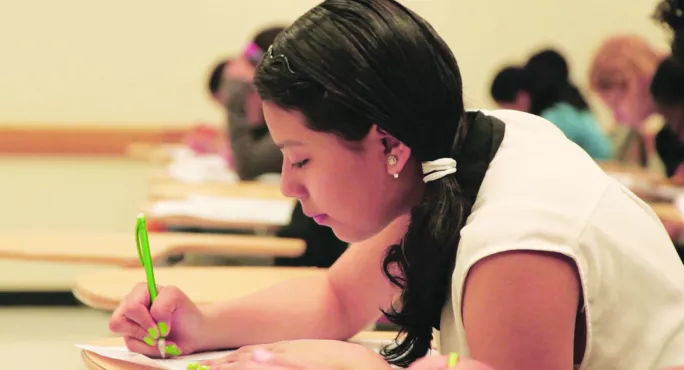What a new movie on selection in schools says about the American Dream

The test Laurell is preparing to sit will determine which high school she goes to. But it will also determine a lot more than that.
“You have to think ahead when you’re choosing a high school,” the 13-year-old says. “If I go to a bad school, then I’m not going to have a good life. If I go to a good school, then I’m going to have a good career, a good future ahead of me.”
Laurell is one of the 8th-grade students featured in Tested, a new movie following teenagers from New York City as they prepare for the Specialized High Schools Admissions Test (SHSAT). The film will première on 15 November, at the DOC NYC film festival.
In New York, 5,000 of the students who take the SHSAT each year are rewarded with admission to one of the city’s three ultra-selective specialized high schools, or one of five smaller, less prestigious specialized schools. And 23,000 students who sit the test are not.
“We talk about the American dream,” said the movie’s director, Curtis Chin. “I don’t think the American dream is possible without a really strong public school system. It gives people - whether you’re rich or poor, native-born or immigrant, black, white or Latino - an equal opportunity to make something of yourself.”
And, he added, when the school system is segregated, so too is society: “As the income gap has widened, there’s more anxiety among parents of not wanting to fall on the wrong side of the equation.”
Tested follows 8th graders as they prepare for and then sit the SHSAT. For all of them, this involves attending tuition classes. “I’m only doing this because my mom tells me to,” one pupil says. “If she didn’t, I’d be home, playing computer games, wasting my life, being a horrible person.”
Fifteen per cent of students at New York’s public schools are from an Asian background. By contrast, 29 per cent of SHSAT candidates are Asian. Many of these families send their children for extracurricular tuition from the age of 6. But competitiveness crosses racial divides: a white woman is so determined that her children will succeed that even her Asian friends have begun referring to her as a tiger mother.
Mr Chin acknowledged that it was natural for parents to want the best for their own children. “But you see this over-competitiveness when it comes to education,” he said. “You see families competing against each other. They see it as other people’s children taking the seats that belong to their kids. I don’t think that’s particularly helpful for long-term opportunities.”
The movie highlights the fact that places at good schools are significantly more available to children from upper-middle-class or white backgrounds than to poor, African-American or Latino students.
“How can a student prepare for a test when they’re coming to school hungry or when they have safety issues getting from home to school?” Mr Chin said. “Or when they have a stressful situation at home, because the parents are both unemployed? People don’t want to have that conversation.”
Ada Mau, a research associate at the UK’s King’s College London, was a consultant on Tested. She, too, questions the value of a selective schooling system.
“Selection isn’t good for education equality as a whole,” she said. “Maybe a small number of high-achieving children might benefit, but those lower down suffer from inequalities as a result of the system.”
And, she added, the movie allows viewers to understand the impact that high-stakes tests have on young teenagers and their families. For Laurell, for example, the pressure of preparation is too great, and she decides not to sit the test, after all.
“The whole social mobility thing - obviously that’s what people strive for,” Dr Mau said. “These so-called elite schools lead to better universities, better careers. But these policies have huge consequences for families and their children.”
Keep reading for just £1 per month
You've reached your limit of free articles this month. Subscribe for £1 per month for three months and get:
- Unlimited access to all Tes magazine content
- Exclusive subscriber-only stories
- Award-winning email newsletters



